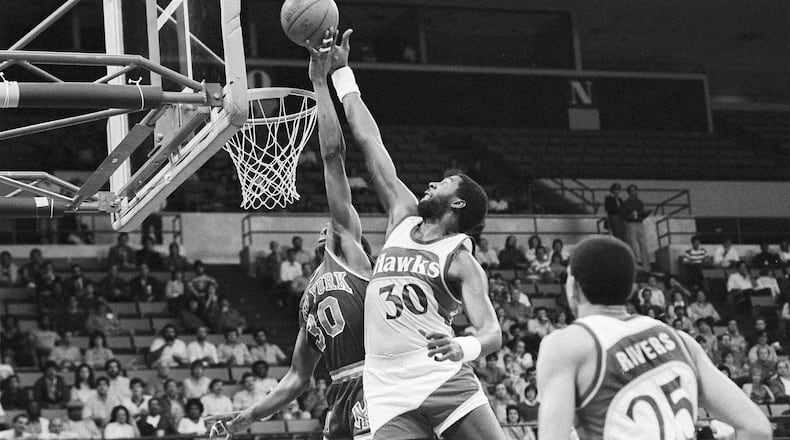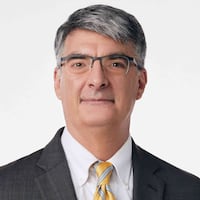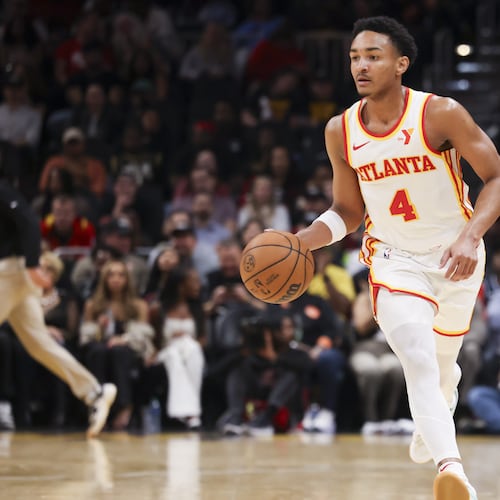Editor’s note: At a time when sports are shut down, including the canceled Final Four in Atlanta and many other postponed events, we take a look (in no particular order) at some of the bizarre moments from Georgia sports history.
A test for a possible franchise move.
An easy way to make a needed $1.2 million.
A publicity stunt.
The Hawks played 12 home games in New Orleans during the 1984-85 NBA season, and the reason for the experiment may be any or all of the above possibilities.
Entering what would be the height of an era of Hawks basketball — with a roster that included Dominique Wilkins, Doc Rivers, Kevin Willis, Tree Rollins, Mike Glenn, Cliff Livingston and Randy Wittman — the Hawks agreed to the unique arrangement.
It didn’t go over well — in Atlanta or New Orleans.
“What do I remember about that? It was one of the worst times in Atlanta that I experienced,” Wilkins told The Atlanta Journal-Constitution recently.
These weren't just average games, either. The 12-game stint included "visits" from the Bulls and Michael Jordan and the Celtics and Larry Bird. The Hawks went 6-6 in the games played at the University of New Orleans' Lakefront Arena. The average attendance was 3,915, and that included a crowd of 10,079 against the Celtics when Bird scored 60 points. The second-largest crowd was 5,647 for the Bulls in Jordan's rookie season. The first game of the series was against the Jazz, who had relocated from the city five years earlier, and it drew 4,107 fans. Total attendance for the 12 games was just 46,980.
“We kind of took in stride and thought, ‘OK, we’ll have another home crowd in New Orleans,’ ” Glenn said recently in reflection. “That’s how we felt. As the season progressed and we had games down there, that’s when we found out it was very different, not such a good idea. You did not have the home-crowd feel and the cheering, and the city didn’t really embrace us as their team. The home-court advantage was definitely gone. It was more like road games.
“I remember from my rookie year, they really supported the whole Jazz culture. They had the lady with the umbrella and they would be dancing and playing the great jazz music. We didn’t have any of that. Not only did we not have Atlanta culture, we did not have New Orleans culture. We were just kind of in between, playing a game in a semi-empty arena. The basketball experience was not very good.”
New Orleans lost the Jazz to Salt Lake City in 1979. New Orleans promoter Barry Mendelson made the $1.2 million offer to the Hawks for the 1984-85 season. It may have been a ploy to lure the Hawks to relocate or a test of whether New Orleans would support another NBA team. It was clear that the city would not support a borrowed team, one that did not belong to it entirely.
The NBA eventually returned to New Orleans when the Charlotte Hornets relocated to the city in 2002.
Whether the Hawks would have moved to New Orleans remains in question. The Hawks were struggling financially and with attendance. There were reports that the Hawks lost $80,000 for each home game, a figure president Stan Kasten did not dispute. The $1.2 million windfall, a substantial amount of money in those days, helped.
However, Kasten was adamant at the time the arrangement was not a precursor to a move, but a test for New Orleans to possible get an expansion team.
“If it works out, it would erase our (operating) deficit and make the Hawks’ franchise strong,” Kasten said at the time. “The team isn’t going anywhere. Why on earth would (owner) Ted (Turner) want the team out of Atlanta? He isn’t giving it up.”
With the Hawks averaging about 6,500 fans, Kasten said it would be easier to get season-ticket buyers to commit to 29 home games rather than 41.
The plan, once it was worked out with the team’s lease at the Omni, called for weeknight games in New Orleans. Mendelson cited the “fierce” competition for entertainment options on weekends.
“I’m glad that didn’t pan out, that we were able to stay in Atlanta where this team belongs,” said Wilkins, one player who thought the arrangement may be a test for a possible move. “That was a horrible time. After that, I did jumping jacks when they said we weren’t going to play any more games down there. It was not good.
“Look, I love the city of New Orleans, don’t get me wrong. The food is great. Mardi Gras. All these great things when you talk about the city, like the music. But it just didn’t support a basketball team, in my opinion. I’m glad it didn’t at that time.”
The Hawks did not make the playoffs during that season. However, they qualified for the postseason in 12 of the next 14 seasons, including seven trips to the conference semifinals, as far as they would progress. They also had seven seasons with at least 50 wins. Atlanta would embrace the Hawks as Wilkins, on his way to the Hall of Fame, and company entered their prime seasons. Home games in New Orleans became a bizarre blip in Hawks history.
WELCOME TO NEW ORLEANS
The Hawks played 12 home games in New Orleans during the 1984-85 season. Here is how they fared:
Date/Opponent/Result/Score/Attendance
Nov. 21, 1984/Jazz/W/122-90/4,107
Nov. 28, 1984/Bucks/W/95-83/2,172
Dec. 12, 1984/Cavaliers/W/116-83/3,082
Dec. 20, 1984/Bulls/L/132-129 2OT/5,647
Dec. 26, 1984/Knicks/W/117-105/3,846
Jan. 22, 1985/Pistons/L/130-113/4,109
Jan. 29, 1985/Pacers/W/115-106/3,082
Feb. 5, 1985/Mavericks/L/112-103/3,127
March 5, 1985/Trail Blazers/L/100-91/2,822
March 12, 1985/Celtics/L/126-115/10,079
March 19, 1985/Bullets/W/103-97/2,125
March 26, 1985/Nets/L/109-108 OT/2,782
About the Author
Keep Reading
The Latest
Featured



